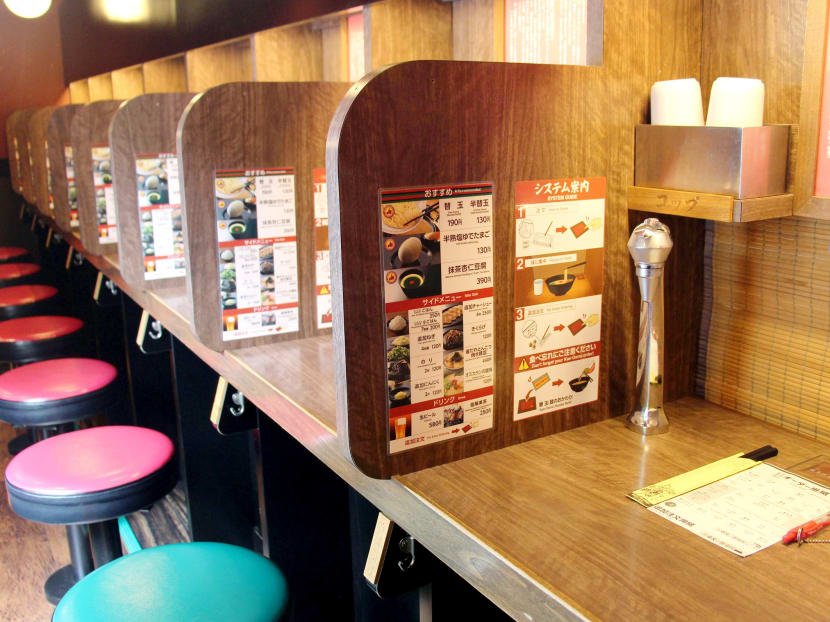Solo dining, karaoke strike chord among lone Japanese consumers
FUKUOKA — If you crave privacy at lunch and cringe at small talk, Japan has the ramen joint just for lone diners like you, where you can slurp your noodles in peace.

Ichiran Ramen’s private dining booths are targeted at patrons who value privacy and minimal human interaction. Photo: Kyodo News
FUKUOKA — If you crave privacy at lunch and cringe at small talk, Japan has the ramen joint just for lone diners like you, where you can slurp your noodles in peace.
As demographics shift in the greying country, Japan is witnessing an expansion of businesses catering to solo customers, including restaurants, golf courses and even karaoke lounges.
Some ramen noodle shops and yakiniku grilled meat restaurants, which customarily serve families or groups, are switching gears to focus on the individual customer who enjoys dining alone without distractions from staff or other patrons.
Service industry insiders believe the trend reflects an effort to address diversifying consumer tastes amid the country’s greying society, declining birth rates and protracted deflation.
“We have devised a way that customers can enjoy ramen without being bothered by others around them looking in their direction. This is especially (popular with) women,” said a spokesperson for the Hakata ramen chain Ichiran Ramen from Fukuoka, northern Kyushu, known for their tonkotsu (pork bone) broth ramen.
Ichiran provides solo dining booths separated by wooden panels, obstructing the view of potential neighbours on either side.
When entering the shop, customers buy tickets from a vending machine, which allows them to select the type of ramen they wish to order and eat at any vacant booth.
Instead of being escorted to a table by a waiter, customers take their booths alone where they press a call button and present their tickets to a server through a shutter in front of them that remains lowered except when orders are placed and food is served.
Customers also have the option of customising their orders with various toppings, as well as for degrees of flavour, soup thickness, and even firmness of noodles, with a paper card that is handed to staff through the same screen. Once the dish is ready, the shutter lifts again and the server hands over the ramen bowl.
The company’s patented “flavour concentration counter” system was conceived by its president, Mr Manabu Yoshitomi, in the 1990s. Mr Yoshitomi’s main objective became developing an arrangement where customers could be totally engrossed in their food, without worrying about the people around them or who is serving the dishes.
He got the idea for private booths by surveying his customers. He discovered that many women found it difficult to visit ramen shops alone because of their reluctance of being watched by others as they slurp their noodles.
Four out of 10 customers at Ichiran are women and they are a driving force for the ramen shop these days. There are more than 70 locations in Japan, and the business has expanded to Hong Kong, Taiwan and New York.
The West Co restaurant chain has yakiniku grilled meat outlets along the major roads in Fukuoka’s Hakata Ward with individual seats for the lone customer. The shops, which provide a lunchtime service, have become popular among office workers and are being frequented by a growing number of women.
“We decided to introduce this because we thought it would be attractive to those who want to eat by themselves,” said Mr Masaharu Hagi, the head of the restaurant’s general planning office. In the future, West is planning to offer individual seating throughout the restaurant at some of its outlets.
Singing solo became a trend mainly among young women in the mid-2000s, but now it has thoroughly taken root. Koshidaka Holdings Co, known for its Karaoke Manekineko shops, has been providing “1 kara” solo singing in urban areas such as Tokyo, Osaka, Sendai, Miyagi Prefecture, and Kawasaki since 2011.
As other karaoke companies vie for business from lone customers, Koshidaka has developed high-fidelity microphones and headphones that allow users to sing their hearts out alone in a sound-proof room.
“We have a high rate of repeat users, and sales continue to grow at a steady clip,” said a company spokesperson.
Value Golf is a system that allows the user to make reservations alone at golf clubs. Once the customer chooses a schedule on the website, he or she is matched with people who wish to play rounds of golf together during the same period.
There are some 380,000 registered Value Golf members, most of whom are middle aged and elderly men. “After retirement, there are many people who find it difficult to make friends, so there is a lot of potential here,” said a person in charge of the service.
Ms Tomoki Inoue, an associate analyst at think-tank NLI Research Institute, who is familiar with consumer behaviour, said the trend towards catering to individual customers is a sign of changing demographics.
“Because people are marrying late and other factors, there has been an increase in single people even among the middle aged and elderly, and this market is growing,” said Ms Inoue.
“It’s necessary to expand the customer base in segments like the restaurant industry where the competition is fierce … this trend of welcoming the lone customer will continue.” KYODO NEWS









